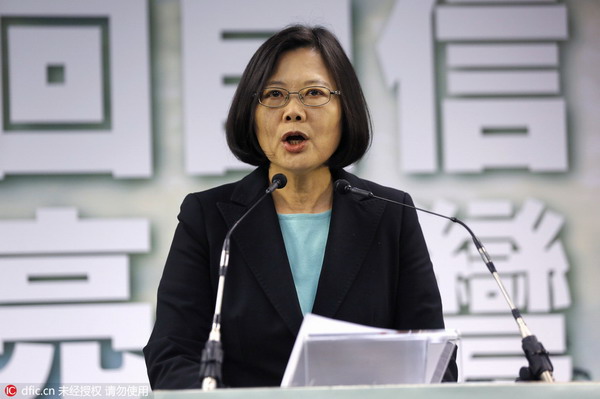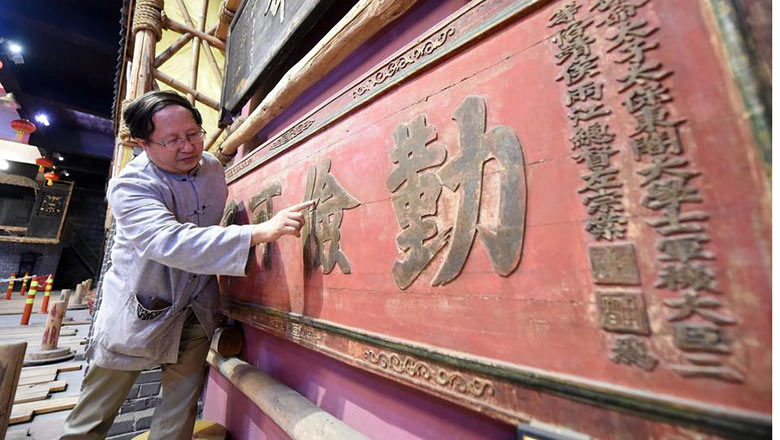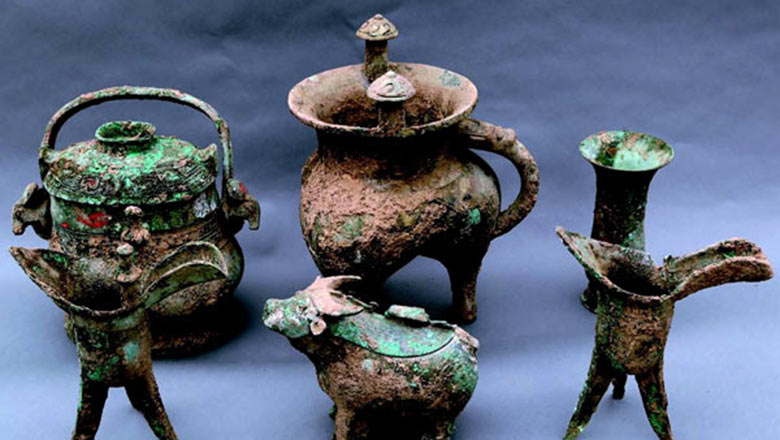Tsai may jeopardize US policy
Updated: 2016-05-19 07:06
(China Daily)
|
||||||||
 |
|
Taiwan's main opposition Democratic Progressive Party, DPP, Chairperson Tsai Ing-wen speaks during a press conference in Taipei, Taiwan, Wednesday, April 15, 2015. [Photo/IC] |
As part of the increased interaction in the run-up to May 20 when Taiwan's leader-elect Tsai Ing-wen is scheduled to take office, US Secretary of State John Kerry reiterated to Chinese Foreign Minister Wang Yi in a telephone conversation on Monday that the United States' stance remains unchanged and Washington will not support "Taiwan independence".
It is to be hoped the US is as good as its word.
Since its establishment of diplomatic ties with the Chinese mainland, the US has maintained essentially quasi-official political, economic and military relations with Taiwan. Its dual-track foreign policy is aimed at maintaining the "no reunification, no independence" status quo across the Straits and striking a strategic balance between the two sides to the US' advantage.
Concerned that Tsai's predecessor Ma Ying-jeou's policy was too "pro-mainland", the US demonstrated a strong preference for Tsai's pro-independence Democratic Progressive Party during the island's election. And Washington not only failed to pressure Tsai into embracing the 1992 Consensus, but also extended her a high-profile reception during her visit to the US.
A recent report by the Center for Strategic and International Studies, an influential US think-tank, even proposed the US government demand the Chinese mainland allow Tsai to use "equivocal terms" regarding the 1992 Consensus to show a more flexible attitude toward the island.
Washington's DPP-tilted approach may be because it wants to play the "Taiwan card" against the Chinese mainland in the context of the strategic competition emerging with Beijing in the South China Sea, and its perception that cross-Straits peace would not be sabotaged if Tsai does not directly challenge the one-China principle.
The US undoubtedly underestimates the possibility of DPP pursuing "Taiwan's independence", which risks destroying Washington's skillfully employed "neutral and balanced" policy toward the two sides of the Taiwan Straits.
--Overseas edition of People's Daily
- Taiwan leader stresses mainland's importance to island's economy
- US urged to 'properly tackle Taiwan question'
- Policy is to consolidate ties with Taiwan
- 'Taiwan independence' will never succeed, premier stresses
- Preferential Taiwan business policies to remain unchanged
- Taiwan's new leader urged to uphold 1992 Consensus
- Xi vows to curb Taiwan secessionists
- Russia to build first cruise liner in 60 years
- LinkedIn, Airbnb match refugees with jobs, disaster survivors with rooms
- Duterte 'willing to improve ties' with Beijing
- Canadian PM to introduce transgender rights bill
- Hillary Clinton says her husband not to serve in her cabinet
- New York cake show designs fool your eyes

 Can you still recognize these cities?
Can you still recognize these cities?
 A private museum owner's devotion to cultural protection
A private museum owner's devotion to cultural protection
 China's top 10 archaeological discoveries
China's top 10 archaeological discoveries
 Apple's CEO Tim Cook's eight visits to China in four years
Apple's CEO Tim Cook's eight visits to China in four years
 Annual New York cake show designs fool your eyes
Annual New York cake show designs fool your eyes
 Divers find ancient Roman cargo from shipwreck in Israel
Divers find ancient Roman cargo from shipwreck in Israel
 Taoist priests worship their ancestors in Central China
Taoist priests worship their ancestors in Central China
 The world in photos: May 9-May 15
The world in photos: May 9-May 15
Most Viewed
Editor's Picks

|

|

|

|

|

|
Today's Top News
Liang avoids jail in shooting death
China's finance minister addresses ratings downgrade
Duke alumni visit Chinese Embassy
Marriott unlikely to top Anbang offer for Starwood: Observers
Chinese biopharma debuts on Nasdaq
What ends Jeb Bush's White House hopes
Investigation for Nicolas's campaign
Will US-ASEAN meeting be good for region?
US Weekly

|

|







